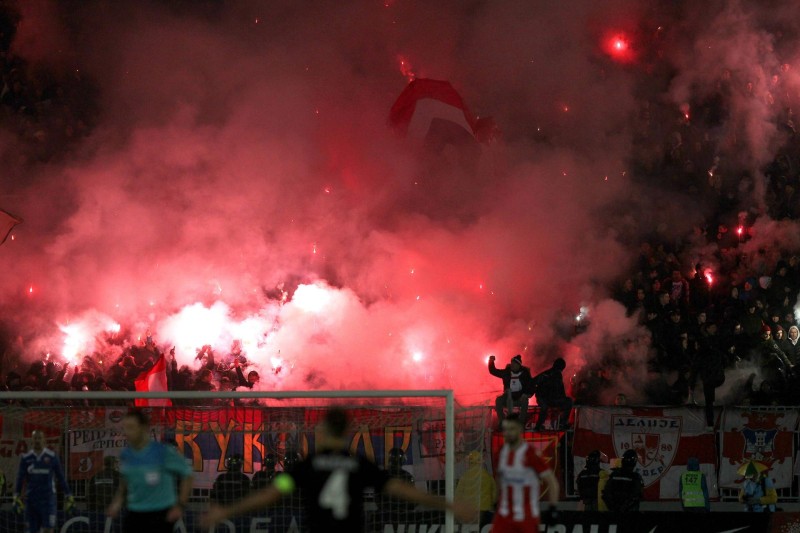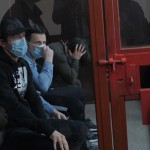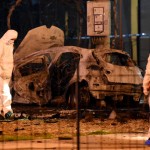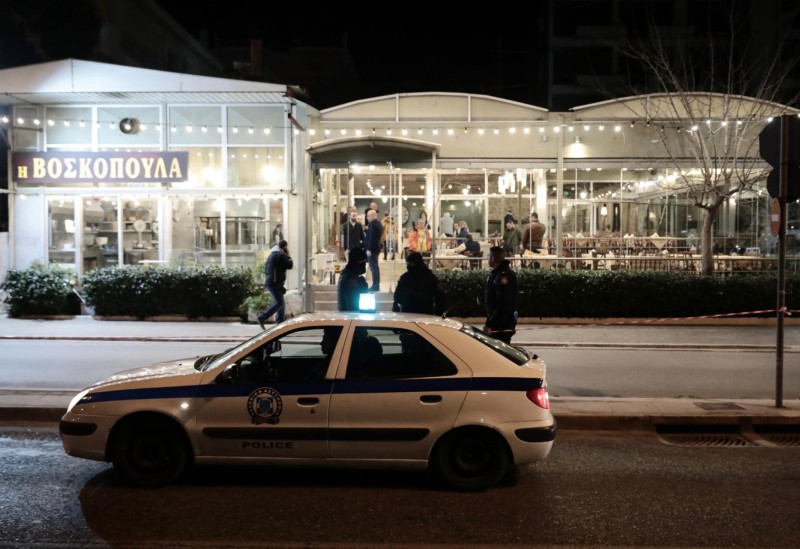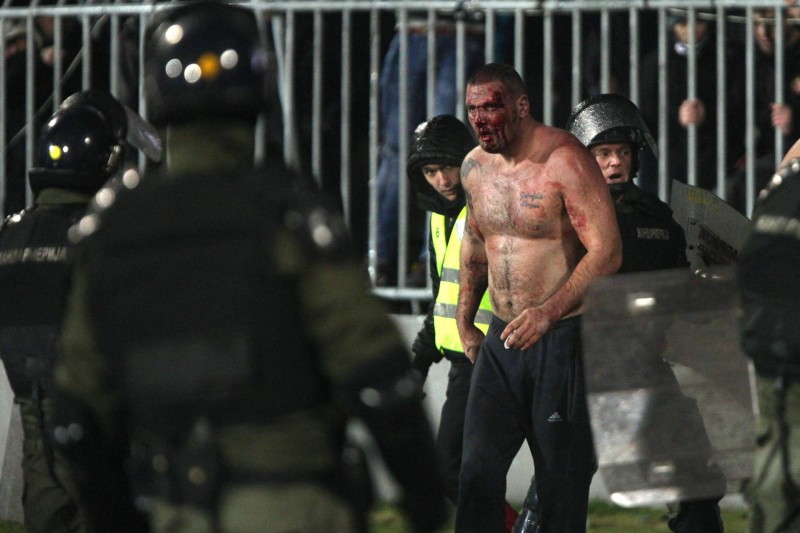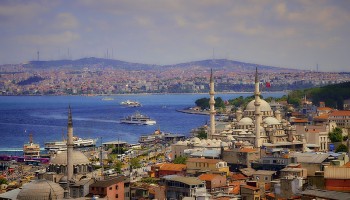For years, Jovan Vukotić was a leader of a criminal gang that carved a bloody trail through the Balkans. But as he sat in a Serbian detention center in late 2019, he was so afraid of being murdered he had his girlfriend bring his meals to him from outside.
His caution may have saved his life: In December, four men were arrested and are now under investigation for allegedly impersonating police officers in order to poison the food she was bringing him. The men were hired by a rival gang, the Kavač, according to sources with knowledge of the case.
Vukotić is one of two leaders of the Škaljari, which is embroiled in a bloody feud with the Kavač. The rivalry between these two Montenegrin clans has given rise to at least 41 deaths since 2015.
Vukotić could have been one of them, had he not taken extreme precautions with the help of his girlfriend, Maša Mišić.
“That food was gathered from different restaurants, or Maša was preparing it at home, because I had information that my life was at risk,” he said in a statement to Serbian prosecutors.
But his enemies got creative. The alleged assassins, dressed as police officers, stopped a taxi transporting Mišić and spent 20 minutes rifling through her things, apparently in the hope of poisoning the food she was carrying. Fortunately for Vukotić, they found only empty containers, since she was still on her way to pick it up.
A forensic report obtained by KRIK, an OCCRP member center in Serbia, said the would-be assassins were carrying cyanide.
Vukotić has since been extradited to his native Montenegro, but the deadly rivalry between the Škaljari and Kavač is still being played out across Europe.
Both gangs originated in Kotor, on Montenegro’s Adriatic coast, and members used to work together smuggling cocaine from South America into Europe. But they fell out over a bad deal in 2014, and the ensuing conflict has ruptured the criminal underworld in Serbia and Montenegro, prompting other crime groups, and even some police and politicians, to pick sides.
Below are short profiles of key players in their drug war, which has spilled over the borders of the former Yugoslavia to claim lives in other European countries.
Jovan Vukotić, Škaljari leader
Born in 1980 in Kotor, Jovan Vukotić graduated from Maritime High School as a nautical technician, though it is unclear if he ever actually worked at sea.
In a 2018 statement to prosecutors, Vukotić said he was unemployed and earned less than 2,000 euros a month by renting out apartments owned by his family. His rap sheet, however, hints at his true profession: head of an organized crime group.
Vukotić was convicted of abetting an attempted murder after he and a friend entered a Kotor nightclub in 2002 and opened fire on the owners, wounding one. After 12 years, the verdict was finalized in 2014 and Vukotić was arrested and thrown in jail while trying to flee the country in a Mercedes.
He served one year for that crime and got out in 2015. Vukotić was convicted the following year of possessing an illegal weapon, but he never served any time.
Vukotić was also accused of taking part in another nightclub attack in 2012, this time at Madame Coco in the Montenegrin coastal town of Tivat. In 2017 his brother Igor and another Škaljari member, Jovan Jovanović, were convicted over the shooting, which wounded a security guard. Vukotić, however, was found not guilty.
The following year, Vukotić was arrested in Turkey for reasons that remain unclear — although it has emerged that Greek authorities were investigating him at the time for allegedly smuggling 135 kilograms of cocaine into the country. Turkey deported him to Serbia, where he also holds citizenship, and where he was sentenced on separate charges of travelling on a false passport.
Greek authorities asked a Serbian prosecutor to also take over the drug smuggling investigation, but he refused, claiming that there was not enough evidence to pursue the case.
Vukotić was extradited in February this year to Montenegro, where he is now in prison awaiting trial for the attempted murder of two members of the Kavač clan and the wife of one of the Kavač’s leaders, Radoje Zvicer.
Vukotić’s brother Igor, meanwhile, is on the run after being charged with membership in an organized crime group. Their father, Veselin, was shot and killed in front of the family home in Kotor in April last year. The murder remains unsolved. “We will preserve our honor as you have taught us all our lives,” Jovan Vukotić wrote in an obituary for his father. “Life is transient.”
Igor Dedović, Škaljari leader
Igor Dedović was killed by gunmen in January this year while eating dinner with his wife and children in a restaurant in Athens. He was 43.
While a classified Serbian intelligence report listed an address for him in Kotor, Dedović had not lived in Montenegro for years before his death. The report said he had split his time between Bosnia and Herzegovina, Croatia, and Brazil.
In 2018, a Montenegrin court sentenced Dedović to two years and two months in prison for possession of illegal weapons, after police found a small arsenal buried in the ground with his DNA on the wrapping.
Dedović was also under investigation in Montenegro for attempted murder. Police say that he and Vukotić tried to kill members of the Kavač clan in a March 2016 gun attack in a parking lot in Kotor that left one man badly injured.
Vukotić wrote an obituary for Dedović, referring to him as “kum,” a term that can refer to the best man at one’s wedding, someone who has been involved in a family baptism, or simply a very close friend.
It read: “It is difficult, kum, to fight against human downfall, against informants, false accusations and rigged warrants.”
Slobodan Kašćelan, Kavač leader
At 57, Slobodan Kašćelan is the oldest of the four leaders of the two clans. He was born in Kotor, where he lives today on probation.
His biography is a litany of violence. In 2016 he was attacked by a gunman on a motorcycle who fired at his car in Novi Sad, Serbia’s second-largest city.
In May the following year, Montenegrin prosecutors issued an indictment for Kašćelan for “organizing” a criminal gang. Prosecutors also indicted 14 Kavač members, who they said were involved in crimes including drug trafficking, money laundering, extortion, and usury. Their trial is ongoing.
Kašćelan was finally arrested in Prague by a special unit of Czech police in December 2018. Police said he had spent time in 10 European countries under several false identities. He was extradited to Montenegro, but instead of being jailed was given probation after pledging 500,000 euros worth of property as bail.
Kašćelan was already on the run when he was indicted for his role in the Kavač gang. The charges stemmed from a 2010 shootout, when he and another man got into a dispute in a restaurant parking lot in Prčanj, a small tourist town on the Bay of Kotor.
Neither man was injured, but both were charged over the incident, and Kašćelan was sentenced in October 2019 to two years and four months in prison. The verdict is now being appealed.
Radoje Zvicer, Kavač leader
Radoje Zvicer is the most mysterious leader of the two clans. Reporters have only been able to unearth one photograph of him, and there is little extant information about his criminal or personal life.
He was born in Kotor 37 years ago but has not lived there for many years, preferring to spend his time in Belgrade, according to Serbian intelligence.
In 2016, his wife, Tamara, nearly became a victim of the rivalry between the Kavač and Škaljari clans. She was driving in Kotor with their young daughter when another car blocked her way. Vukotić, the Škaljari leader, fired several shots towards her vehicle, though all of them missed.
Zvicer has written several obituaries for murdered Kavač members that have been published in Montenegrin newspapers, including one for Vladimir Roganović, who was shot dead in Vienna in December 2018.
“Nobody was like you. Your brother loves you,” Zvicer wrote.
Filip Korać, organized crime leader
Despite being considered one of Serbia’s most powerful organized crime leaders, Filip Korać has never been convicted of a major offense in the country and has no outstanding charges against him.
In January 2019, Serbian police issued an arrest warrant for Korać for his alleged involvement in the murder of another gangster. During a press conference to announce the arrests of 150 crime group members, Minister of Police Nebojša Stefanović told reporters that Korać was now officially a wanted man.
But by the end of last year, the case against Korać had fallen apart. Prosecutors dropped the charges for lack of evidence, enraging officials including Serbian President Aleksandar Vučić.
"I'm so angry. And as a president, but above all as an ordinary man with three children, [I’m] worried,” said Vučić in January 2020, accusing Korać of dealing drugs to children and calling him one of the “most dangerous people in the country.
Serbian intelligence agreed with that assessment. "The Škaljari clan enjoys the support of Filip Korać, leader of one of the most powerful groups that operates internationally," the agency said in its classified report.
Korać was the right-hand man of the notorious Serbian criminal Luka Bojović. After Bojović was arrested in Spain in 2012 and sent to prison on charges including participating in a criminal group and possessing illegal weapons, Korać inherited leadership of his crime group. It has no name, but is notorious for murder and drug dealing.
Aleksandar Stanković, “Janissaries” hooligan group leader
Aleksandar Stanković, known as “Sale the Mute”, was killed in a barrage of machine-gun fire while getting into his Audi A6 on an autumn night in Belgrade in 2016.
Until then he had been leader of the football hooligan group known as the Janissaries, which is named after the elite military corps who were recruited mostly from the Balkans and served Ottoman sultans. The group rallies in support of Belgrade’s Partizan football club, and it is closely associated with the Kavač gang.
During a December 2017 match, the Janissaries engaged in a bloody clash with thugs who intelligence officers say were sent from neighboring Croatia by Korać. The match was stopped and police stormed into the stands and arrested several men.
"Those riots were allegedly motivated by Filip Korać's intention to take over the narcotics trade, which is being carried out by certain supporters groups close to FC Partizan," according to Serbian intelligence.
In 2013, a Serbian court convicted Stanković of dealing drugs and sentenced him to five years and 10 months in prison. However, he was never locked up as the courts delayed his sentence 12 times, mainly for health issues. Photos show, however, that Stanković’s condition did not stop him from attending football matches.
Stanković was also closely linked to high-level Serbian politicians and law enforcement, including high-ranking police officer Nenad Vučković. Members of his gang even provided security for the 2017 inauguration of President Vučić after his death, where they assaulted protesters and journalists. Vučić’s son, Danilo, is friends with Aleksandar Vidojević, one of the most powerful members of the Janissaries.
The day after Stanković was murdered the Serbian Minister of Police, Stefanović, declared war on the mafia. But KRIK’s investigation shows that police have mainly targeted the Škaljari, who are enemies of the Janissaries and the Kavač clan.
